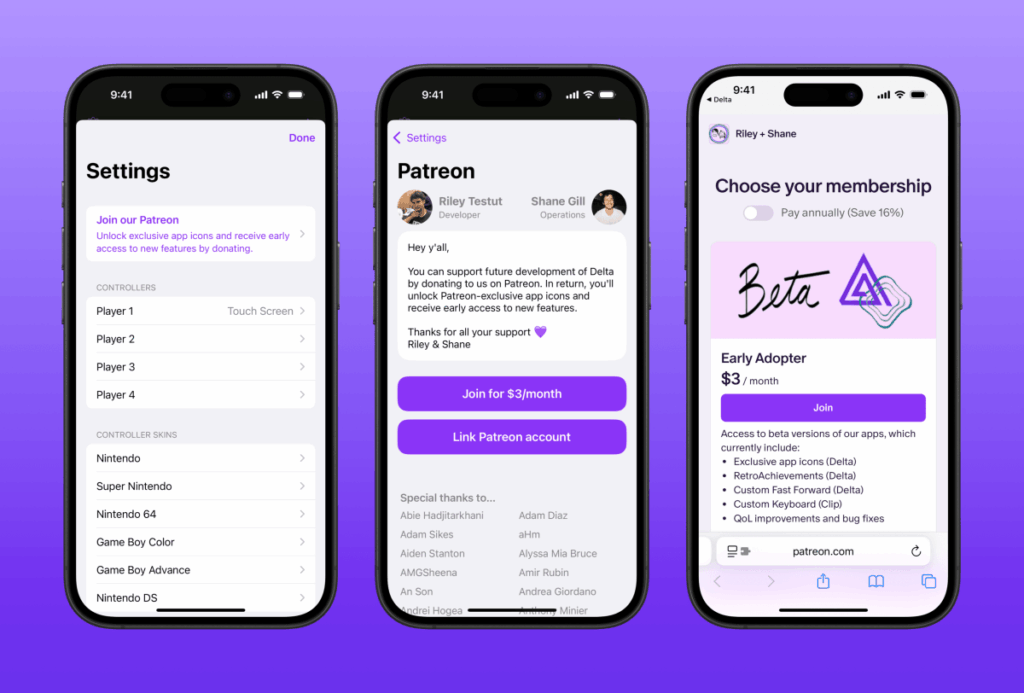
<strong>Image Credits:</strong>Delta
Delta App Integrates Patreon Support Following US App Store Policy Changes
Table of Contents
- Introduction to Delta’s Patreon Integration
- The Court Ruling That Changed App Store Policy
- How Apple Modified Its App Store Rules
- Delta’s Update: Direct Patreon Integration
- Business Implications for Indie Developers
- User Experience and Payment Options
- Apple’s Own UI Tactics Mirrored
- Future Outlook for Patreon-Supported Apps
The popular game emulator Delta has introduced a significant update that takes advantage of recent changes to Apple’s App Store policies in the United States. This update, approved on Wednesday, allows Delta to directly integrate Patreon support within its iOS app, enabling users to subscribe to the developer’s Patreon membership without giving Apple its traditional commission. This represents one of the first implementations of external payment options following the landmark court decision in the Epic Games vs. Apple case.
Delta’s new iOS app update featuring direct Patreon integration without Apple’s commission. (Image Credits: Delta)
Introduction to Delta’s Patreon Integration
Delta, a game emulator app created by developer Riley Testut, has become one of the first applications to leverage the recently modified US App Store policies by implementing direct Patreon integration. The app update, which received approval on Wednesday, allows users to subscribe to Delta’s $3 per month Patreon membership directly from within the iOS app—without Apple taking its customary cut of the subscription revenue.
This integration enables Delta to offer exclusive features and perks to subscribers while retaining 100% of the subscription revenue, marking a significant shift in how iOS apps can monetize their services. For users, the process is streamlined: they can join Delta’s Patreon through a dedicated button in the app’s Settings screen, with the web page opening directly inside the application.
The Court Ruling That Changed App Store Policy
The Epic vs. Apple Case
The changes to the App Store’s external payment policies stem from Judge Yvonne Gonzalez Rogers’ ruling that Apple had failed to comply with her original injunction in the high-profile antitrust lawsuit filed by Epic Games, the maker of Fortnite. While Apple largely won the lawsuit, the judge determined that Apple hadn’t properly followed court orders regarding in-app purchases.
Last week’s court ruling forced Apple to fully open its US App Store to external purchases after years of legal battles with Epic Games. Though Apple had previously attempted to comply with earlier court orders by allowing certain apps to link to external payment options, the implementation included barriers that the court ultimately found insufficient:
- Apple vetted which apps could link to external payment options
- Warning screens were implemented to discourage users from making external purchases
- A 27% commission was still charged on web sales (reduced from the standard 30%)
Judge Yvonne Gonzalez Rogers determined that these measures did not satisfy her original injunction, compelling Apple to make more substantial changes to its App Store policies in the United States.
How Apple Modified Its App Store Rules
Following the court ruling, Apple implemented significant changes to its App Store policies for developers in the United States. These modifications have been quickly adopted by major companies including Spotify, Amazon Kindle, and Patreon, all of which have updated their iOS apps to incorporate direct payment links to their websites.
| Previous Policy | New Policy |
|---|---|
| Required use of Apple’s in-app purchase system for digital goods and services | Allows links to external payment options for digital goods and services |
| 27-30% commission on all transactions | No commission on external web transactions (when using external links) |
| Warning screens for external payment options | No mandatory warning screens required |
| Restricted mention of external payment options | Freedom to mention and promote external payment options |
These policy changes represent a significant shift in Apple’s approach to App Store monetization, particularly for developers who rely on subscription-based revenue models. While the changes currently only apply to the US App Store, they set a precedent that could influence Apple’s policies in other regions in the future.
Delta’s Update: Direct Patreon Integration
Key Features of Delta’s Patreon Integration
Delta’s implementation showcases how developers can effectively integrate external payment options to maximize revenue while still complying with App Store guidelines. The app’s clean, user-friendly interface makes the Patreon subscription process seamless while strategically positioning Apple’s payment option as an “alternative.”
In the updated version of Delta, users can access a “Join our Patreon” option directly from the app’s Settings screen. This prominent button allows users to subscribe to Delta’s monthly Patreon membership, which costs $3 per month and provides access to exclusive features and other benefits. The subscription process happens entirely within the app via an embedded web page, eliminating the need to switch between applications.
“We can now freely mention our Patreon without giving Apple 27% of donations,” noted Delta creator Riley Testut in a social media post, adding “Goodbye scare screens”—referencing the previously required warnings that were designed to discourage users from making external purchases.
While Delta still includes Apple’s in-app purchase option as required by the App Store guidelines, it’s noticeably tucked away under an “Alternative Payment Methods” menu in the Settings screen—a location many users might never explore. This strategic UI design effectively promotes the Patreon option that benefits both users and developers by avoiding Apple’s commission.
Business Implications for Indie Developers
The ability to integrate direct payment options represents a potential renaissance for indie app development on iOS, which has been declining in recent years. Small developers have struggled to build sustainable businesses while paying Apple’s 30% commission, but these policy changes offer a lifeline by allowing them to keep more of their revenue.
While major companies like Spotify and Amazon will certainly benefit from these changes, the impact could be even more profound for independent developers like the Delta team. For these smaller studios, the difference between keeping 70% versus 100% of revenue can determine whether a project remains viable.
Several factors have contributed to the decline in indie iOS app development:
- Apple’s high commission rates making profitability challenging
- iOS releases that “sherlock” (copy) third-party app functionality
- Increasing competition and marketing costs
- Limited monetization options that work within Apple’s ecosystem
The new policy changes address at least one of these challenges by providing more flexible monetization options that allow developers to retain a larger share of their revenue, particularly through Patreon and similar membership platforms.
User Experience and Payment Options

Delta’s settings screen showing the prominent “Join our Patreon” option with Apple’s IAP option hidden under “Alternative Payment Methods.” (Image Credits: Delta)
From a user perspective, Delta’s implementation of Patreon integration offers several advantages over the traditional in-app purchase system:
| Feature | User Benefit |
|---|---|
| Single membership across platforms | Users can access their Patreon benefits on any device or platform, not just iOS |
| Community integration | Access to Patreon-exclusive community features, updates, and communication |
| Flexible payment options | More payment methods available compared to Apple’s system |
| Support goes directly to developers | Users know their full payment supports the creators they appreciate |
Before this update, Delta users could only link an existing Patreon account within the app but couldn’t subscribe directly. The new implementation streamlines the process by allowing users to both link accounts and choose membership tiers without leaving the application, significantly reducing friction in the user experience.
Apple’s Own UI Tactics Mirrored
Strategic UI Design Lessons
Delta’s implementation strategically uses UI design principles to prioritize its preferred payment option while technically complying with App Store rules. Developers can learn from this approach by understanding how interface design influences user choices and implementing similar strategies in their own apps.
In an interesting twist, Delta’s approach of hiding Apple’s in-app purchase option deep within a submenu mirrors tactics that Apple itself has employed over the years. Apple has frequently placed pro-consumer options in hard-to-find locations within iOS settings, a practice now being adopted by developers looking to promote their preferred payment methods.
For example, if iOS users want to disable Apple’s personalized ads (similar to the “Do Not Track” authorization required for third-party apps), they must navigate through multiple layers of menus: Settings → Privacy & Security → scroll to the bottom → Apple Advertising → toggle off Personalized Ads. Similarly, clearing app usage data that personalizes App Store recommendations requires navigating through Settings → Apps → App Store → scroll to the bottom → Personalized Recommendations → Clear App Usage Data.
By adopting similar UI strategies, Delta effectively satisfies Apple’s requirement to include in-app purchase options while subtly guiding users toward the direct Patreon subscription that benefits both the user and developer. The fact that Apple’s App Review approved this implementation suggests that other developers may be able to employ similar techniques in their own apps.
Future Outlook for Patreon-Supported Apps
Delta’s successful implementation of direct Patreon integration, now approved by Apple’s App Review team, likely signals the beginning of a trend. We can expect to see an increasing number of Patreon-supported applications emerging on the iOS App Store in the near future, particularly among indie developers who have previously struggled with monetization.
This shift could lead to several positive developments in the iOS ecosystem:
- More sustainable business models for indie developers
- Increased innovation as developers can afford to take more risks
- Greater diversity of applications available to users
- Closer relationships between developers and their most dedicated users
- More frequent updates and improvements to existing apps
For users who value unique, high-quality applications and want to directly support their creators, these changes represent a win. The ability to directly fund developers through platforms like Patreon while still enjoying seamless integration within iOS apps creates a more sustainable ecosystem for both creators and consumers.
Frequently Asked Questions
| Question | Answer |
|---|---|
| Does Delta still offer in-app purchases through Apple? | Yes, as required by App Store guidelines, Delta still offers Apple’s in-app purchase option, though it’s now tucked away under an “Alternative Payment Methods” menu in the Settings screen. |
| Can all iOS apps now implement direct Patreon integration? | Currently, these policy changes only apply to apps on the US App Store. Developers with apps available in the US can implement similar integrations following Apple’s updated guidelines. |
| Does Apple take any commission from Patreon subscriptions made through Delta? | No, subscriptions made through the direct Patreon link bypass Apple’s payment system entirely, allowing developers to retain 100% of the subscription revenue (minus Patreon’s own fees). |
| Will these changes affect app prices for consumers? | Potentially. With more revenue going directly to developers, some may choose to offer lower prices for direct payments compared to in-app purchases, passing some savings to consumers. |
Delta’s Patreon integration represents just the beginning of a new era for iOS app monetization in the US market. As more developers adopt similar strategies, we’ll likely see increased innovation, improved sustainability for indie developers, and more diverse payment options for users. These changes, forced by court ruling rather than Apple’s own initiative, may ultimately strengthen the iOS app ecosystem by making it more financially viable for the developers who create its most unique and valuable experiences.





